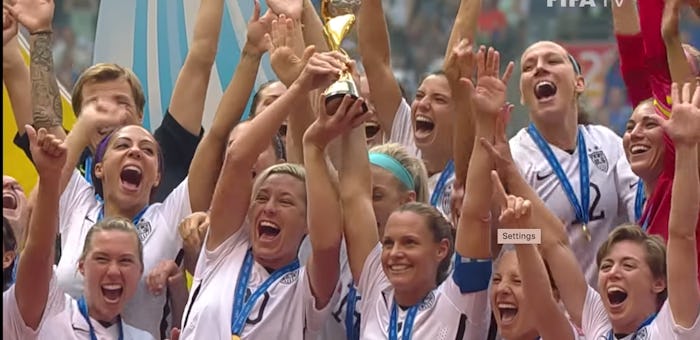News
Why The U.S. Women's Soccer Team's Gender Discrimination Lawsuit Is So Important
It's no secret that gender inequality exists in the workplace. From men getting paid more for doing the same exact job, to women being overlooked for promotions because of the "motherhood penalty," to women being shut out of job sectors simply because they're women, we still live in a very sexist world. (Despite what some people might think.) It's why the U.S. women's soccer team's gender discrimination lawsuit is so important. And why International Women's Day is as relevant now as ever.
According to NBC News, 28 members of the U.S. women's soccer team filed a class-action lawsuit against the U.S. Soccer Federation (USSF,) which employs both the Women's National Soccer Team and the Men's National Soccer Team. The lawsuit was fittingly filed on Friday, March 8 — International Women's Day. The players claim that “institutionalized gender discrimination” is evident by their pay, medical treatment, travel arrangements, and workload, according to The New York Times. As a result, they are seeking equitable pay and treatment, as well as damages including backpay, according to ESPN.
"I understand the gravity and the weight of it, of filing a lawsuit," Megan Rapinoe, a forward for the U.S. Women's National Team, told ESPN. "In that sense, it is a step up. But I also feel very much it's just another step in the process. This has been a long process — honestly, a decades-long process for all the players that came before. For us, we just feel this is the next necessary step in our fight toward equality, equal pay, working conditions, all of that."
The document itself lays everything out there plain as day. "Despite the fact that female and male players are called upon to perform the same job responsibilities on their teams and participate in international competitions for their single common employer, the USSF, the female players have been consistently paid less money than their male counterparts," the lawsuit reads, according to PopSugar Fitness. This mic-drop moment follows:
This is true even though their performance has been superior to that of the male players — with the female players, in contrast to male players, becoming world champions.
Yep, they went there. Because getting paid less than your male counterparts — especially when you put in more hours, play more games, and consistently prove yourselves as world champions — is just plain bullsh*t. Tennis legend Billie Jean King's Twitter reaction summed it up perfectly. "What better day than #InternationalWomensDay for this lawsuit," King tweeted. "Sports are a microcosm of society. What is happening with the @USWNT is happening in the workplace. The time has come to give these athletes what they deserve: equality."
You have to admit, the women's team does make a good point. And they have the numbers to back it up. Another section of the recently-filed lawsuit reads:
For example, from 2015 through 2018, the WNT played nineteen more games than the MNT played over that same period of time. As the MNT averaged approximately seventeen games per year in that time frame, the WNT played the equivalent of more than one additional MNT calendar year season from 2015 through 2018.
(You can read the lawsuit in its entirely here, if you so wish.)
The filing of this lawsuit has been a long time coming. A wage discrimination complaint — which brought many of the same issues to light — was actually filed in 2016 by five U.S. players with the Equal Employment Opportunity Commission, according to The New York Times. Three years and a complete lack of action later, these players received permission in February to sue instead. And they didn't waste any time getting started.
For your entertainment, here's a final mic-drop moment in the document I'd like to share:
The USSF has no legitimate, non-discriminatory reason for this gross disparity in pay, nor can it be explained away by any bona fide seniority, merit, or incentive system or any other factor other than sex.
Boom. Done.
Hopefully, this lawsuit results in actual change for the U.S. women's soccer team — and serves as a precedent for other sports organizations' fights for equality to come.
